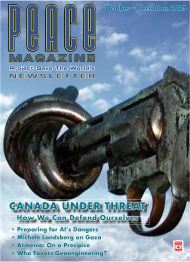From the Editor
First Nations people often refer to any decision made today as having an impact on their descendants seven generations from now. This idea of foresight was also captured in ancient Greece as pronoia “knowing before”—an essential element of prudent decisionmaking and virtuous statesmanship.
In today’s fast-paced, consumer-driven, commuter world, it is difficult to imagine our actions affecting our children’s children more than a century into the future. Our lives are largely shaped around individual and family lifespans, leaving us seemingly oblivious to the long-term consequences of our choices.
This is starkly evident in the way we are dealing with the climate emergency. Our lack of foresight and prudence shapes not only our response to the climate crisis, but also to the overlapping “polycrises” of our era—from nuclear threats to artificial intelligence—that will profoundly affect generations to come.
This duty to our children and to the planet was at the heart of discussions last week marking the 80th anniversary of the founding of the United Nations and its Charter. It was a moment for reflection: how foresight guided powerful nations after the Second World War, leading to the creation of international laws that allowed the world to coexist in relative peace and security across four generations.
But historical memory fades. The imperial rivalries of 1914 that sparked nationalism and world war, followed by the arms race of the 1930s and the devastation of the Second World War, remind us that states realigning into hemispheric power blocs has rarely fostered longterm peace.p. Anticipating these risks, many states at the UN General Assembly last week called for the implementation of the Pact for the Future—a long-term framework, adopted in 2024, to reset international cooperation in line with new global dynamics while reaffirming rights and responsibilities under international law.
In contrast to these constructive discussions, President Trump spoke disparagingly of the UN, dismissing the climate crisis as “the greatest con job ever perpetrated on the world”and framing migration in alarmist terms. Trump has withdrawn the U.S. from cash-strapped U.N. agencies, including the World Health Organization and the Human Rights Council; rescinded about $1 billion in Congressionally appropriated funding for 2025 dues and peacekeeping operations and slashed overall current and future humanitarian spending. Yet this does not diminish the enduring value of the international legal framework that has guided us for 80 years.
By contrast, the inspiring words of Slovenian President Nataša Pirc Musar pointed to a different path. She proposed a permanent advocacy network to give the wide-ranging Pact for the Future reinforced political support. The UN Global Forum for the Future would be an inclusive movement of states committed to multilateralism, mutual respect and the defense of our shared vision. It would aim to implement the recommendations of the Pact for the Future, grounding her appeal in the very foundations of international law (jus cogens).
On Security Council reform, Pirc Musar argued that if some permanent members themselves violate the UN’s core principles—such as the prohibition of genocide or crimes against humanity—whether then they have the right to use the veto power, and also are able to serve as guardians of those principles (Pirc Musar, September 23rd UN speech).
France and Saudi Arabia took the initiative to jointly host an International Conference on the Implementation of the Two-State Solution, and the Recognition of the State of Palestine, in response to the General Assembly’s support for it, in spite of opposition coming from the US as a permanent member of the Security Council.
These debates are difficult and deeply contested, but without leaders guided by foresight and concern for future generations, the world risks sliding into chaos. It is here that the wisdom of the Seven Generation principle, long practiced by First Nations peoples, becomes indispensable. Their perspective offers a moral compass we would do well to heed.



